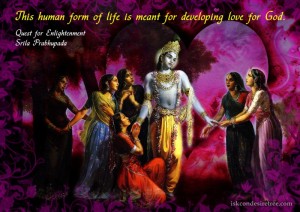Hare Krishna.
5th June, 2014, Gurgaon.
Q: What is the process to achieve the ultimate goal of life-love of God ? Please explain each step in this process.
Ans : Śrī Caitanya Mahāprabhu describes the symptoms of emotion and love and the awakening of one’s original loving relationship with the Lord, as well as the characteristics of a devotee who has actually attained that stage, in Madhya Lila chapter 23.
CC Madhya 23.9: “If, by good fortune, a living entity develops faith in Kṛṣṇa, he begins to associate with devotees.
CC Madhya 23.10: “When one is encouraged in devotional service by the association of devotees, one becomes free from all unwanted contamination by following the regulative principles and chanting and hearing.
CC Madhya 23.11: “When one is freed from all unwanted contamination, he advances with firm faith. When firm faith in devotional service awakens, a taste for hearing and chanting also awakens.
CC Madhya 23.12: “After taste is awakened, a deep attachment arises, and from that attachment the seed of love for Kṛṣṇa grows in the heart.
CC Madhya 23.13: “When that ecstatic emotional stage intensifies, it is called love of Godhead. Such love is life’s ultimate goal and the reservoir of all pleasure.
Srila Prabhupada quotes Śrīla Bhaktivinoda Ṭhākura, who summarizes this growth of love of Godhead as a gradual process.
A person becomes interested in devotional service by some good fortune. Eventually he becomes interested in pure devotional service without material contamination. At that point, a person wants to associate with devotees. As a result of this association, he becomes more and more interested in discharging devotional service and hearing and chanting. The more one is interested in hearing and chanting, the more he is purified of material contamination. Liberation from material contamination is called anartha-nivṛtti, indicating a diminishing of all unwanted things. This is the test of development in devotional service. If one actually develops the devotional attitude, he must be freed from the material contamination of illicit sex, intoxication, gambling and meat-eating. These are the preliminary symptoms. When one is freed from all material contamination, his firm faith in devotional service awakens. When firm faith develops, a taste arises, and by that taste one becomes attached to devotional service. When this attachment intensifies, the seed of love of Kṛṣṇa fructifies. This position is called prīti or rati (affection) or bhāva (emotion). When rati intensifies, it is called love of Godhead. This love of Godhead is actually life’s highest perfection and the reservoir of all pleasure.
Thus devotional life is divided into two stages — sādhana-bhakti and bhāva-bhakti. Sādhana-bhakti refers to the development of devotional service through the regulative principles. The basic principle for the execution of devotional service is faith. Above that, there is association with devotees, and after that there is initiation by a bona fide spiritual master. After initiation, when one follows the regulative principles of devotional service, one becomes freed from all unwanted things. In this way one becomes firmly fixed and gradually develops a taste for devotional service. The more the taste grows, the more one desires to render service to the Lord. In this way one becomes attached to a particular mellow in the Lord’s service — śānta, dāsya, sakhya, vātsalya or madhura. As a result of such attachment, bhāva develops. Bhāva-bhakti is the platform of purified goodness. By such purified goodness, one’s heart melts in devotional service. Bhāva-bhakti is the first seed of love of Godhead. This emotional stage is there before one attains pure love. When that emotional stage intensifies, it is called prema-bhakti, or transcendental love of Godhead. This gradual process is also described in the following two verses, which are found in the Bhakti-rasāmṛta-sindhu (1.4.15-16).
ādau śraddhā tataḥ sādhu-
saṅgo ‘tha bhajana-kriyā
tato ‘nartha-nivṛttiḥ syāt
tato niṣṭhā rucis tataḥ
athāsaktis tato bhāvas
tataḥ premābhyudañcati
sādhakānām ayaṁ premṇaḥ
prādurbhāve bhavet kramaḥ
CC Madhya 23.14-15: “‘In the beginning there must be faith. Then one becomes interested in associating with pure devotees. Thereafter one is initiated by the spiritual master and executes the regulative principles under his orders. Thus one is freed from all unwanted habits and becomes firmly fixed in devotional service. Thereafter, one develops taste and attachment. This is the way of sādhana-bhakti, the execution of devotional service according to the regulative principles. Gradually emotions intensify, and finally there is an awakening of love. This is the gradual development of love of Godhead for the devotee interested in Kṛṣṇa consciousness.’
Q: What are the nine symptoms which manifest in one’s behaviour when the seed of ecstatic emotion for Krishna fructifies ?
Ans:
CC Madhya 23.18-19: “‘When the seed of ecstatic emotion for Kṛṣṇa fructifies, the following nine symptoms manifest in one’s behavior: forgiveness, concern that time should not be wasted, detachment, absence of false prestige, hope, eagerness, a taste for chanting the holy name of the Lord, attachment to descriptions of the transcendental qualities of the Lord, and affection for those places where the Lord resides — that is, a temple or a holy place like Vṛndāvana. These are all called anubhāva, subordinate signs of ecstatic emotion. They are visible in a person in whose heart the seed of love of God has begun to fructify.’
Love of God is transcendental to liberation [mukti], and thus it is called the fifth stage of spiritual realization, above the stage of liberation. (Srimad Bhagavatam Introduction)
All glories to Sri Guru and Gauranga.
All glories to Srila Prabhupada.
Kindly visit http://www.forthepleasureoflordkrishna.com to subscribe to this blog.

Comments